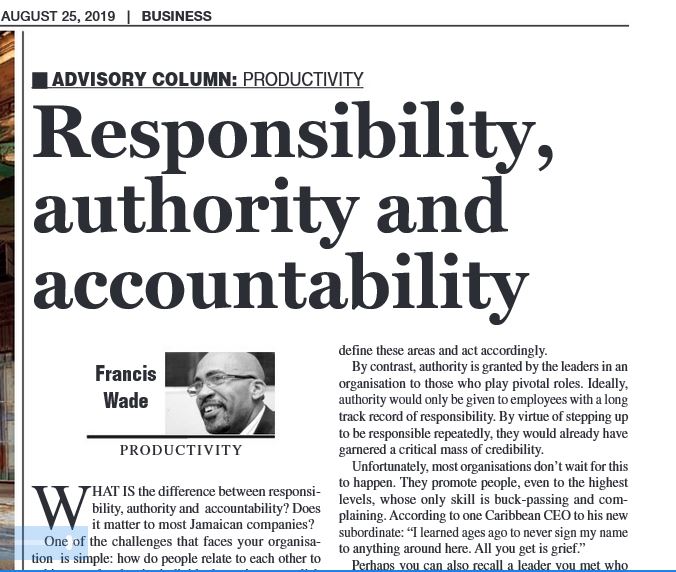What is the difference between responsibility, authority and accountability? Does it matter to most Jamaican companies?
One of the challenges that faces your organization is simple: how do people relate to each other to achieve goals that its individuals can’t accomplish alone? A part of the answer lies in the following quote:
“Responsibility is always taken. Authority is given, but Accountability is negotiated.”
Of course, this is no ordinary list. In fact, it corrects a problem staff have in most companies who use the terms interchangeably.
The reality? They aren’t the same. And when your employees mistakenly merge them into one, it perpetuates a confusion which blocks the path to high achievements.
Here’s how you can untangle them.
Responsibility
The quote indicates that people who are responsible create a special relationship with particular results. Furthermore, they do so using nothing more than an inner will or conscious intention. While this requires a level of intrinsic motivation, it’s also true that the trigger to initiate a new “zone” of responsibility may come from anywhere. Possible sources include a direct invitation from another, a catastrophic event or an inspiring biography.
Therefore, don’t think that you can “hold someone responsible.” The most important step takes place within the individual who exercises his/her free will.
However, some managers argue otherwise: they honestly believe they can use force to conjure up responsible subordinates. The result of their muscle? A Jamaican workplace full of Bredda Anansi-like fake-responsibility.
It’s tricky to spot: At the start it appears that someone has truly stepped up. The truth only reveals itself later, when the first big obstacle shows up and the blame game starts. Consequently, it becomes clear that they weren’t in the responsibility game at all: they were simply taking credit while things were going well.
Beyond such shenanigans, the amazing thing is that anyone can take responsibility for any outcome they wish. Our National Heroes were elevated precisely because they willingly did so for a large number of people, putting themselves in harm’s way to accomplish a grand, shared objective.
Most of us may never take responsibility at that high level. Fortunately, your organization doesn’t need you to be famous or a life-risker. All it asks is that you keep generating fresh zones of responsibility in service of shared goals. It’s up to you to continually define these areas and act accordingly.
Authority
By contrast, authority is granted by the leaders in an organization to those who play pivotal roles. Ideally, authority would only be given to employees with a long track record of responsibility. By virtue of stepping up to be responsible repeatedly, they would already have garnered a critical mass of credibility.
Unfortunately, most organizations don’t wait for this to happen. They promote people (even to the highest levels) whose only skill is buck-passing and complaining. According to one Caribbean CEO to his new subordinate: “I learned ages ago to never sign my name to anything around here. All you get is grief.”
Perhaps you can also recall a leader you met who is that twisted.
Sometimes, such persons are exposed as the frauds they truly are, but it happens too rarely. More often, they are tolerated and enabled by others who are petrified by the authority they wield.
Accountability
However, when authority works in daily life, it’s comprised of individual accountabilities. These are defined as discrete agreements (or partnerships) between a leader and a stakeholder to produce a particular outcome according to specific conditions of satisfaction. For example, I may promise my manager to “Sell x units by Sep 30th at a 50% profit margin.”
Such agreements are the sinews of an organization. Without them, it’s impossible for my manager to have a proper follow-up conversation with me on October 1st. In other words, when accountability is missing, any result will do.
Once again, in an ideal world, persons promoted to positions of authority should have a firm grasp of this unique relationship. Usually, they can point to a number of accountable partnerships which helped them produce results, and explain the special role of this ingredient.
Unfortunately, you probably also have met managers who occupy important positions but don’t know how to hold people around them to account. Therefore, when good things happen, it’s by sheer luck; not because they reinforced the sinews of accountability.
For example, sometimes weak leaders are fortunate to hire great employees. These rare workers reverse the tables, forcing (or shaming) their manager into an accountable relationship by insisting on high standards.
As a result, such cases are few and far between. For too many staff-members, their manager fails to create either accountability or responsibility. These rich worlds simply don’t exist.
Companies who separate and teach these three elements empower everyone. When they occur together, but separately, they open the door to outstanding results individuals cannot produce by themselves.

Chronicles from a Caribbean Cubicle
New Thinking from Framework Consulting
